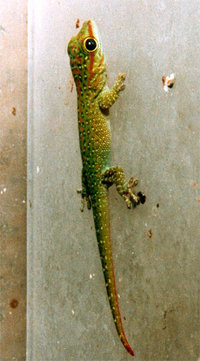Madagascar day gecko
|
|
| Madagascar day gecko | ||||||||||||||||||
|---|---|---|---|---|---|---|---|---|---|---|---|---|---|---|---|---|---|---|
 A juvenile | ||||||||||||||||||
| Scientific classification | ||||||||||||||||||
| ||||||||||||||||||
| Binomial name | ||||||||||||||||||
| Phelsuma madagascariensis |
Madagascar day gecko (Phelsuma madagascariensis madagascariensis (Gray 1831)) is a diurnal subspecies of geckos. It lives on the eastern coast of Madagascar and typically inhabits rainforests and dwells on trees. The Madagascar day gecko feeds on insects and nectar.
| Contents |
Scientific synonyms:
- Gekko madagascariensis Gray 1831
- Phelsuma sarrube [Wiegmann 1834]
- Phelsuma madagascariensis martensi Mertens 1962
- Phelsuma madagascariensis - Glaw & Vences 1994: 290
Appearance
This lizard belongs to the largest living day geckos. It can reach a total length of about 22 cm. The body color is light green or bluish green. The skin between the scales often has a light color. A rust-coloured stripe extends from the nostril to behind the eye. On the back there are brownish or red-brick coloured dots which may form a thin line along the mid back. These lizards do not have eyelids, and they have flattenned toe pads.
Distribution
This species inhabits the whole east coast of Madagascar. It can also be found on the islets Nosy Bohara and Ste. Marie.
Habitat
P. m. magascariensis is often found on trees along the edges of forests. They also inhabit local huts and banana trees. The east coast of Madagascar has a humid and warm climate.
Diet
These day geckos feed on various insects and other invertebrates. They also like to lick soft, sweet fruit, pollen and nectar.
Behaviour
Like most Phelsuma spec., the males can be quite quarrelsome and do not accept other males in their neighbourhood. In captivity, where the females cannot escape, the males can also sometimes seriously wound a female. In this case the male and female must be separated.
Reproduction
The pairing season is between November and the first weeks of April. During this period, the females lay up to 6 pairs of eggs. At a temperature of 28°C, the young will hatch after approximately 55 days. The juveniles measure 55–60 mm.
Care and maintenance in captivity
These animals should be housed in pairs and need a large, well planted terrarium. The temperature should be between 25 and 28°C. The humidity should be maintained between 75 and 100 %. In captivity, these animals can be fed with crickets, wax moth larvae, fruit flies, mealworms and houseflies.
References
- Henkel, F.-W. and W. Schmidt (1995) Amphibien und Reptilien Madagaskars, der Maskarenen, Seychellen und Komoren. Ulmer Stuttgart. ISBN 3800173239
- McKeown, Sean (1993) The general care and maintenance of day geckos. Advanced Vivarium Systems, Lakeside CA.nl:Madagaskardaggekko
